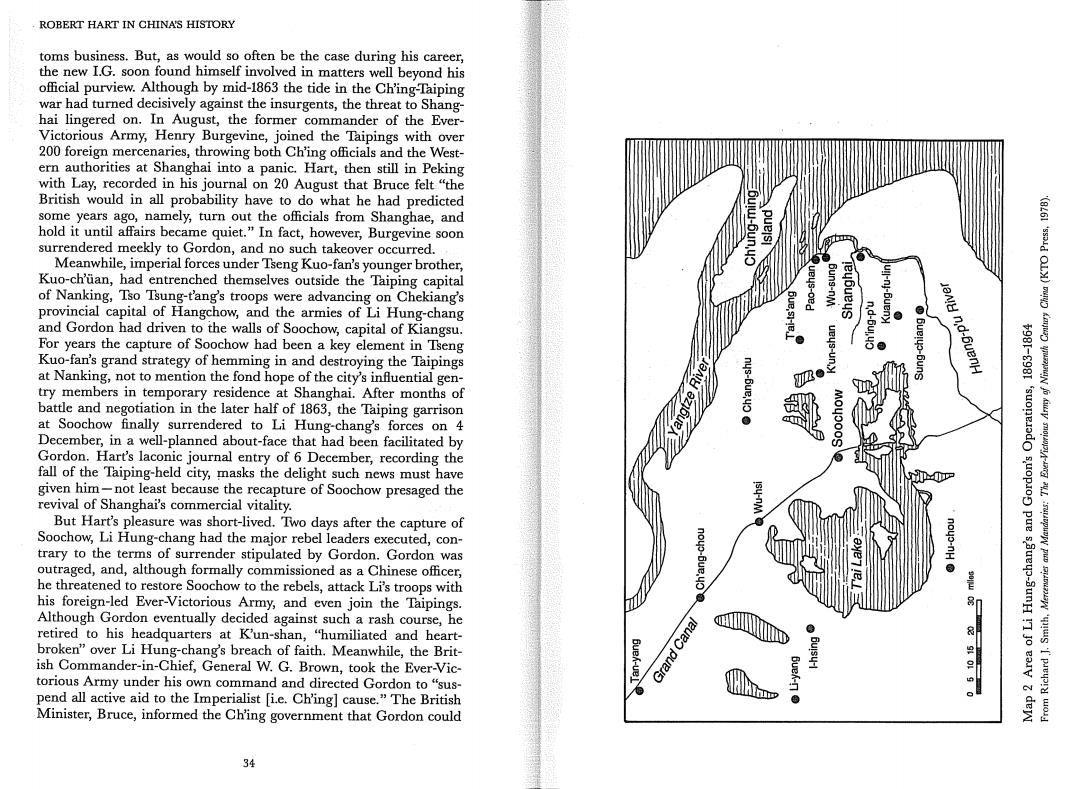
ROBERT HART IN CHINAS HISTORY toms business.But,as would so often be the case during his career, the new I.G.soon found himself involved in matters well beyond his official purview.Although by mid-1863 the tide in the Ch'ingTaiping war had turned decisively against the insurgents,the threat to Shang- hai lingered on.In August,the former commander of the Ever- Victorious Army,Henry Burgevine,joined the Taipings with over 200 foreign mercenaries,throwing both Ch'ing officials and the West- ern authorities at Shanghai into a panic.Hart,then still in Peking with Lay,recorded in his journal on 20 August that Bruce felt"the British would in all probability have to do what he had predicted some years ago,namely,turn out the officials from Shanghae,and (8561 hold it until affairs became quiet."In fact,however,Burgevine soon surrendered meekly to Gordon,and no such takeover occurred. -bun,uo Meanwhile,imperial forces under Tseng Kuo-fan's younger brother, Kuo-ch'tan,had entrenched themselves outside the Taiping capital of Nanking,Tso Tsung-t'ang's troops were advancing on Chekiang's provincial capital of Hangchow,and the armies of Li Hung-chang ley6ueys ul-nj-Bueny and Gordon had driven to the walls of Soochow,capital of Kiangsu. For years the capture of Soochow had been a key element in Tseng Kuo-fan's grand strategy of hemming in and destroying the Taipings un.> Buelyo-buns n,d-6uenH at Nanking,not to mention the fond hope of the city's influential gen- 4781-298 try members in temporary residence at Shanghai.After months of battle and negotiation in the later half of 1863,the Taiping garrison at Soochow finally surrendered to Li Hung-chang's forces on 4 December,in a well-planned about-face that had been facilitated by Gordon.Hart's laconic journal entry of 6 December,recording the fall of the Taiping-held city,masks the delight such news must have given him-not least because the recapture of Soochow presaged the revival of Shanghai's commercial vitality. isy-nM But Hart's pleasure was short-lived.Two days after the capture of Soochow,Li Hung-chang had the major rebel leaders executed,con- trary to the terms of surrender stipulated by Gordon.Gordon was outraged,and,although formally commissioned as a Chinese officer, noyo-Bue,yo noyo-nH he threatened to restore Soochow to the rebels,attack Li's troops with his foreign-led Ever-Victorious Army,and even join the Taipings. 8n Although Gordon eventually decided against such a rash course,he retired to his headquarters at K'un-shan,"humiliated and heart- broken"over Li Hung-chang's breach of faith.Meanwhile,the Brit- ish Commander-in-Chief,General W.G.Brown,took the Ever-Vic- 6ueA-ueL Grand Canal torious Army under his own command and directed Gordon to"sus- pend all active aid to the Imperialist [i.e.Ch'ing]cause."The British ● Minister,Bruce,informed the Ch'ing government that Gordon could 34
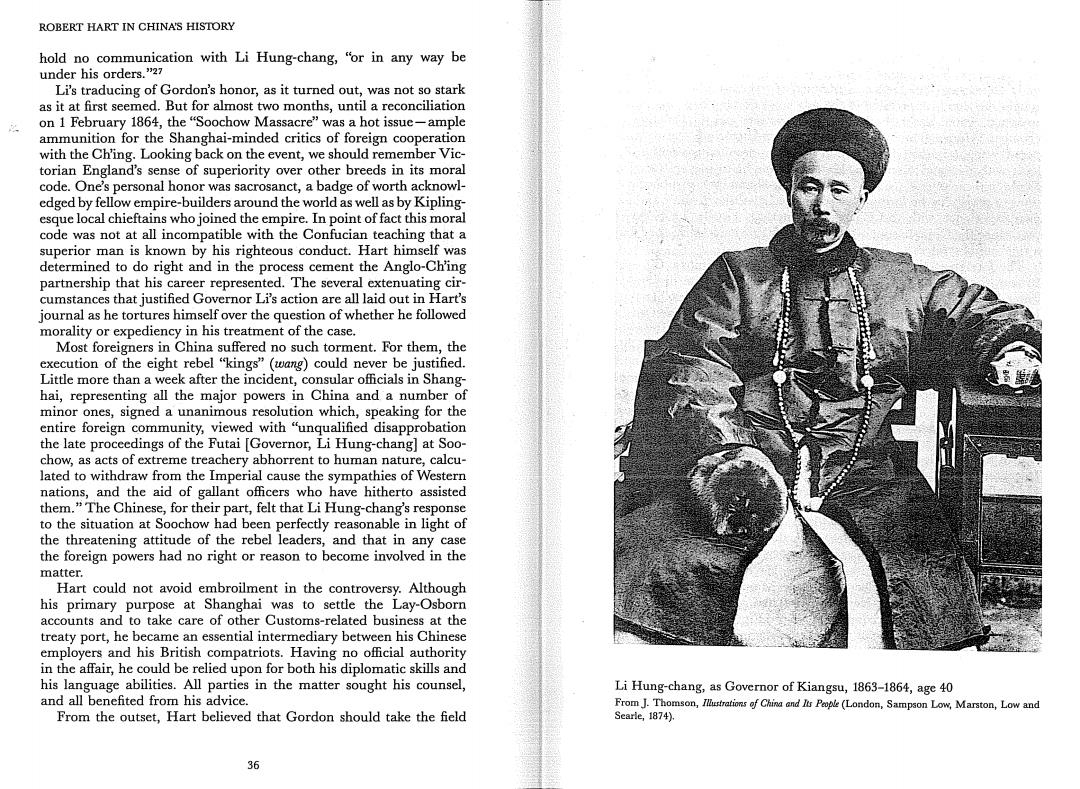
ROBERT HART IN CHINAS HISTORY hold no communication with Li Hung-chang,"or in any way be under his orders."27 Li's traducing of Gordon's honor,as it turned out,was not so stark as it at first seemed.But for almost two months,until a reconciliation on 1 February 1864,the "Soochow Massacre"was a hot issue-ample ammunition for the Shanghai-minded critics of foreign cooperation with the Ch'ing.Looking back on the event,we should remember Vic- torian England's sense of superiority over other breeds in its moral code.One's personal honor was sacrosanct,a badge of worth acknowl- edged by fellow empire-builders around the world as well as by Kipling- esque local chieftains who joined the empire.In point of fact this moral code was not at all incompatible with the Confucian teaching that a superior man is known by his righteous conduct.Hart himself was determined to do right and in the process cement the Anglo-Ch'ing partnership that his career represented.The several extenuating cir- cumstances that justified Governor Li's action are all laid out in Hart's journal as he tortures himself over the question of whether he followed morality or expediency in his treatment of the case. Most foreigners in China suffered no such torment.For them,the execution of the eight rebel "kings"(wang)could never be justified. Little more than a week after the incident,consular officials in Shang- hai,representing all the major powers in China and a number of minor ones,signed a unanimous resolution which,speaking for the entire foreign community,viewed with "unqualified disapprobation the late proceedings of the Futai [Governor,Li Hung-chang]at Soo- chow,as acts of extreme treachery abhorrent to human nature,calcu- lated to withdraw from the Imperial cause the sympathies of Western nations,and the aid of gallant officers who have hitherto assisted them."The Chinese,for their part,felt that Li Hung-chang's response to the situation at Soochow had been perfectly reasonable in light of the threatening attitude of the rebel leaders,and that in any case the foreign powers had no right or reason to become involved in the matter. Hart could not avoid embroilment in the controversy.Although his primary purpose at Shanghai was to settle the Lay-Osborn accounts and to take care of other Customs-related business at the treaty port,he became an essential intermediary between his Chinese employers and his British compatriots.Having no official authority in the affair,he could be relied upon for both his diplomatic skills and his language abilitics.All parties in the matter sought his counsel, Li Hung-chang,as Governor of Kiangsu,1863-1864,age 40 and all benefited from his advice. From J.Thomson,Ilurtrations of China and Its People (London,Sampson Low,Marston,Low and From the outset,Hart believed that Gordon should take the field Searle,1874). 36
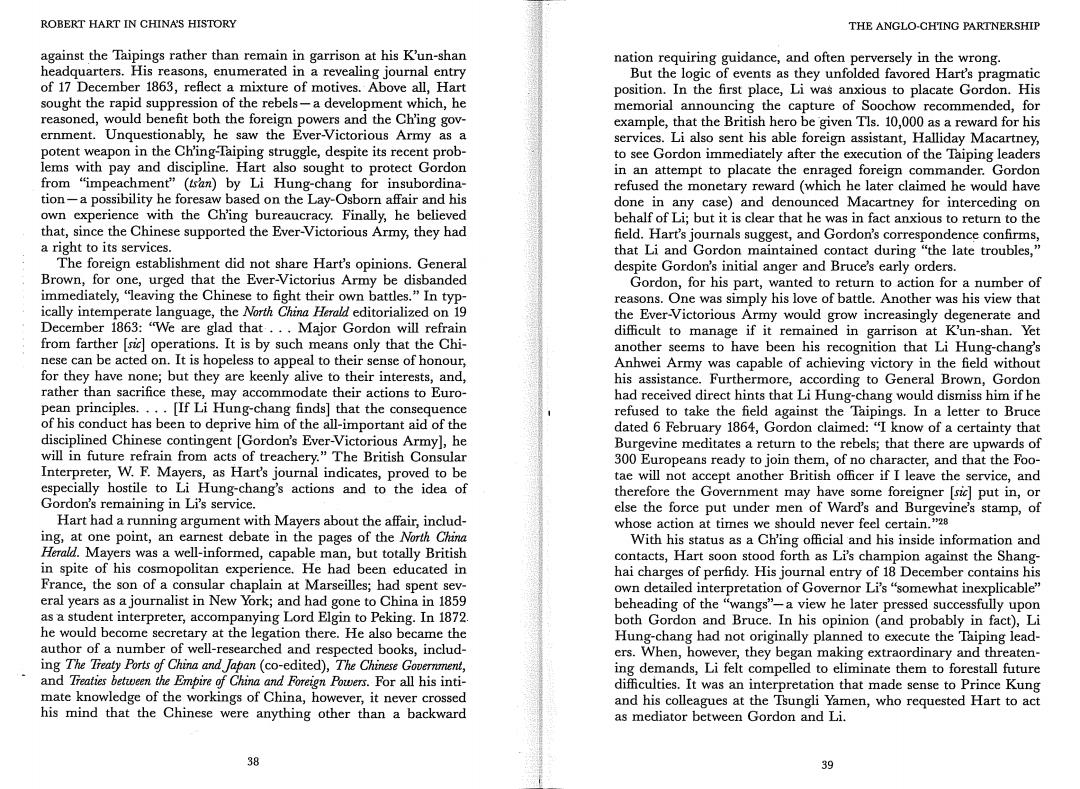
ROBERT HART IN CHINAS HISTORY THE ANGLO-CHING PARTNERSHIP against the Taipings rather than remain in garrison at his K'un-shan nation requiring guidance,and often perversely in the wrong. headquarters.His reasons,enumerated in a revealing journal entry But the logic of events as they unfolded favored Hart's pragmatic of 17 December 1863,reflect a mixture of motives.Above all,Hart position.In the first place,Li was anxious to placate Gordon.His sought the rapid suppression of the rebels-a development which,he memorial announcing the capture of Soochow recommended,for reasoned,would benefit both the foreign powers and the Ch'ing gov- example,that the British hero be given Tls.10,000 as a reward for his ernment.Unquestionably,he saw the Ever-Victorious Army as a services.Li also sent his able foreign assistant,Halliday Macartney, potent weapon in the Ch'ing Taiping struggle,despite its recent prob- to see Gordon immediately after the execution of the Taiping leaders lems with pay and discipline.Hart also sought to protect Gordon in an attempt to placate the enraged foreign commander.Gordon from "impeachment"(san)by Li Hung-chang for insubordina- refused the monetary reward(which he later claimed he would have tion-a possibility he foresaw based on the Lay-Osborn affair and his done in any case)and denounced Macartney for interceding on own experience with the Ch'ing bureaucracy.Finally,he believed behalf of Li;but it is clear that he was in fact anxious to return to the that,since the Chinese supported the Ever-Victorious Army,they had field.Hart's journals suggest,and Gordon's correspondence confirms, a right to its services. that Li and Gordon maintained contact during "the late troubles," The foreign establishment did not share Hart's opinions.General despite Gordon's initial anger and Bruce's early orders. Brown,for one,urged that the Ever-Victorius Army be disbanded Gordon,for his part,wanted to return to action for a number of immediately,"leaving the Chinese to fight their own battles."In typ- reasons.One was simply his love of battle.Another was his view that ically intemperate language,the North China Herald editorialized on 19 the Ever-Victorious Army would grow increasingly degenerate and December 1863:"We are glad that...Major Gordon will refrain difficult to manage if it remained in garrison at K'un-shan.Yet from farther [sic]operations.It is by such means only that the Chi- another seems to have been his recognition that Li Hung-chang's nese can be acted on.It is hopeless to appeal to their sense of honour, Anhwei Army was capable of achieving victory in the field without for they have none;but they are keenly alive to their interests,and, his assistance.Furthermore,according to General Brown,Gordon rather than sacrifice these,may accommodate their actions to Euro- had received direct hints that Li Hung-chang would dismiss him if he pean principles....[If Li Hung-chang finds]that the consequence refused to take the field against the Taipings.In a letter to Bruce of his conduct has been to deprive him of the all-important aid of the dated 6 February 1864,Gordon claimed:"I know of a certainty that disciplined Chinese contingent [Gordon's Ever-Victorious Army],he Burgevine meditates a return to the rebels;that there are upwards of will in future refrain from acts of treachery."The British Consular 300 Europeans ready to join them,of no character,and that the Foo- Interpreter,W.F.Mayers,as Hart's journal indicates,proved to be tae will not accept another British officer if I leave the service,and especially hostile to Li Hung-chang's actions and to the idea of therefore the Government may have some foreigner [sic]put in,or Gordon's remaining in Li's service. else the force put under men of Ward's and Burgevine's stamp,of Hart had a running argument with Mayers about the affair,includ- whose action at times we should never feel certain."28 ing,at one point,an earnest debate in the pages of the North China With his status as a Ch'ing official and his inside information and Herald.Mayers was a well-informed,capable man,but totally British contacts,Hart soon stood forth as Li's champion against the Shang- in spite of his cosmopolitan experience.He had been educated in hai charges of perfidy.His journal entry of 18 December contains his France,the son of a consular chaplain at Marseilles;had spent sev- own detailed interpretation of Governor Li's"somewhat inexplicable" eral years as a journalist in New York;and had gone to China in 1859 beheading of the"wangs"-a view he later pressed successfully upon as a student interpreter,accompanying Lord Elgin to Peking.In 1872. both Gordon and Bruce.In his opinion (and probably in fact),Li he would become secretary at the legation there.He also became the Hung-chang had not originally planned to execute the Taiping lead- author of a number of well-researched and respected books,includ- ers.When,however,they began making extraordinary and threaten- ing The Treaty Ports of China and Japan(co-edited),The Chinese Government, ing demands,Li felt compelled to eliminate them to forestall future and Treaties between the Empire of China and Foreign Powers.For all his inti- difficulties.It was an interpretation that made sense to Prince Kung mate knowledge of the workings of China,however,it never crossed and his colleagues at the Tsungli Yamen,who requested Hart to act his mind that the Chinese were anything other than a backward as mediator between Gordon and Li. 38 39
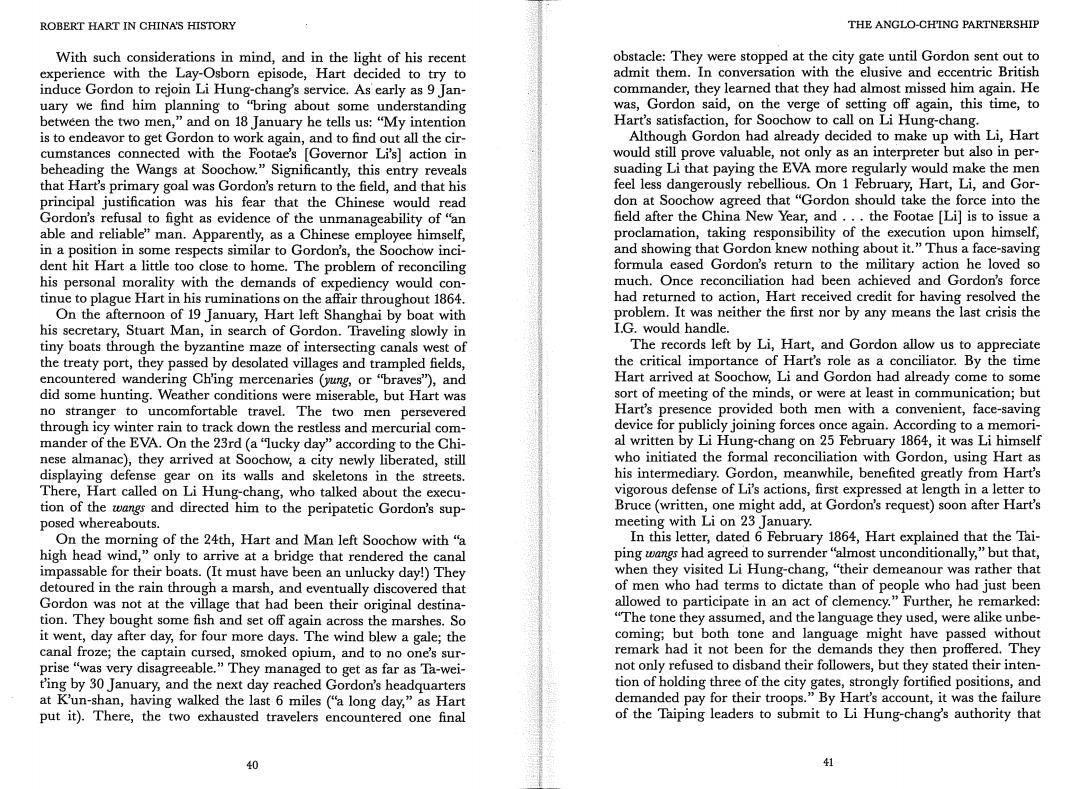
ROBERT HART IN CHINAS HISTORY THE ANGLO-CHING PARTNERSHIP With such considerations in mind,and in the light of his recent obstacle:They were stopped at the city gate until Gordon sent out to experience with the Lay-Osborn episode,Hart decided to try to admit them.In conversation with the elusive and eccentric British induce Gordon to rejoin Li Hung-chang's service.As early as 9 Jan- commander,they learned that they had almost missed him again.He uary we find him planning to "bring about some understanding was,Gordon said,on the verge of setting off again,this time,to between the two men,"and on 18 January he tells us:"My intention Hart's satisfaction,for Soochow to call on Li Hung-chang. is to endeavor to get Gordon to work again,and to find out all the cir- Although Gordon had already decided to make up with Li,Hart cumstances connected with the Footae's [Governor Li's]action in would still prove valuable,not only as an interpreter but also in per- beheading the Wangs at Soochow."Significantly,this entry reveals suading Li that paying the EVA more regularly would make the men that Hart's primary goal was Gordon's return to the field,and that his feel less dangerously rebellious.On 1 February,Hart,Li,and Gor- principal justification was his fear that the Chinese would read don at Soochow agreed that"Gordon should take the force into the Gordon's refusal to fight as evidence of the unmanageability of"an field after the China New Year,and...the Footae [Li]is to issue a able and reliable"man.Apparently,as a Chinese employce himself, proclamation,taking responsibility of the execution upon himself, in a position in some respects similar to Gordon's,the Soochow inci- and showing that Gordon knew nothing about it."Thus a face-saving dent hit Hart a little too close to home.The problem of reconciling formula eased Gordon's return to the military action he loved so his personal morality with the demands of expediency would con- much.Once reconciliation had been achieved and Gordon's force tinue to plague Hart in his ruminations on the affair throughout 1864. had returned to action,Hart received credit for having resolved the On the afternoon of 19 January,Hart left Shanghai by boat with problem.It was neither the first nor by any means the last crisis the his secretary,Stuart Man,in search of Gordon.Traveling slowly in I.G.would handle. tiny boats through the byzantine maze of intersecting canals west of The records left by Li,Hart,and Gordon allow us to appreciate the treaty port,they passed by desolated villages and trampled fields, the critical importance of Hart's role as a conciliator.By the time encountered wandering Ch'ing mercenaries (yung,or "braves"),and Hart arrived at Soochow,Li and Gordon had already come to some did some hunting.Weather conditions were miserable,but Hart was sort of meeting of the minds,or were at least in communication;but no stranger to uncomfortable travel.The two men persevered Hart's presence provided both men with a convenient,face-saving through icy winter rain to track down the restless and mercurial com- device for publicly joining forces once again.According to a memori- mander of the EVA.On the 23rd (a'lucky day"according to the Chi- al written by Li Hung-chang on 25 February 1864,it was Li himself nese almanac),they arrived at Soochow,a city newly liberated,still who initiated the formal reconciliation with Gordon,using Hart as displaying defense gear on its walls and skeletons in the streets. his intermediary.Gordon,meanwhile,benefited greatly from Hart's There,Hart called on Li Hung-chang,who talked about the execu- vigorous defense of Li's actions,first expressed at length in a letter to tion of the wangs and directed him to the peripatetic Gordon's sup- Bruce(written,one might add,at Gordon's request)soon after Hart's posed whereabouts. meeting with Li on 23 January. On the morning of the 24th,Hart and Man left Soochow with "a In this letter,dated 6 February 1864,Hart explained that the Tai- high head wind,"only to arrive at a bridge that rendered the canal ping wangs had agreed to surrender"almost unconditionally,"but that, impassable for their boats.(It must have been an unlucky day!)They when they visited Li Hung-chang,"their demeanour was rather that detoured in the rain through a marsh,and eventually discovered that of men who had terms to dictate than of people who had just been Gordon was not at the village that had been their original destina- allowed to participate in an act of clemency."Further,he remarked: tion.They bought some fish and set off again across the marshes.So "The tone they assumed,and the language they used,were alike unbe- it went,day after day,for four more days.The wind blew a gale;the coming;but both tone and language might have passed without canal froze;the captain cursed,smoked opium,and to no one's sur- remark had it not been for the demands they then proffered.They prise "was very disagreeable."They managed to get as far as Ta-wei- not only refused to disband their followers,but they stated their inten- t'ing by 30 January,and the next day reached Gordon's headquarters tion of holding three of the city gates,strongly fortified positions,and at K'un-shan,having walked the last 6 miles ("a long day,"as Hart demanded pay for their troops."By Hart's account,it was the failure put it).There,the two exhausted travelers encountered one final of the Taiping leaders to submit to Li Hung-chang's authority that 40
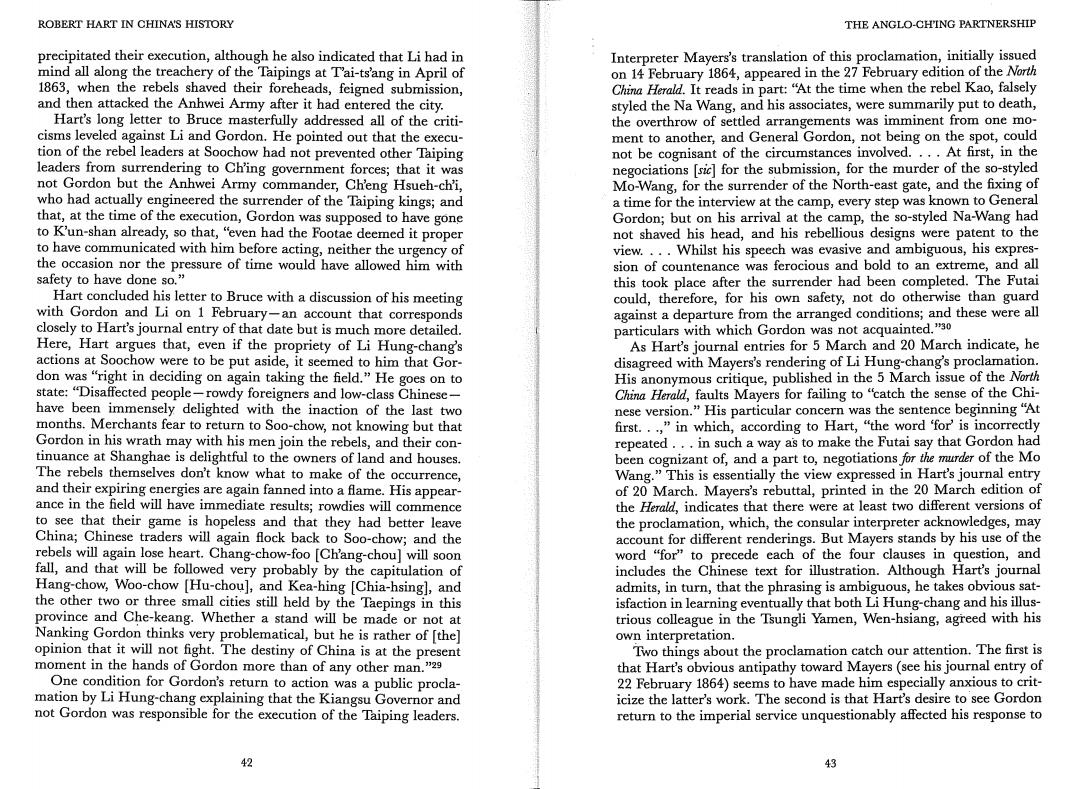
ROBERT HART IN CHINAS HISTORY THE ANGLO-CHING PARTNERSHIP precipitated their execution,although he also indicated that Li had in Interpreter Mayers's translation of this proclamation,initially issued mind all along the treachery of the Taipings at Tai-ts'ang in April of on 14 February 1864,appeared in the 27 February edition of the North 1863,when the rebels shaved their foreheads,feigned submission, China Herald.It reads in part:"At the time when the rebel Kao,falsely and then attacked the Anhwei Army after it had entered the city. styled the Na Wang,and his associates,were summarily put to death, Hart's long letter to Bruce masterfully addressed all of the criti- the overthrow of settled arrangements was imminent from one mo- cisms leveled against Li and Gordon.He pointed out that the execu- ment to another,and General Gordon,not being on the spot,could tion of the rebel leaders at Soochow had not prevented other Taiping not be cognisant of the circumstances involved....At first,in the leaders from surrendering to Ch'ing government forces;that it was negociations [sic]for the submission,for the murder of the so-styled not Gordon but the Anhwei Army commander,Ch'eng Hsueh-ch'i, Mo-Wang,for the surrender of the North-east gate,and the fixing of who had actually engineered the surrender of the Taiping kings;and a time for the interview at the camp,every step was known to General that,at the time of the execution,Gordon was supposed to have gone Gordon;but on his arrival at the camp,the so-styled Na-Wang had to K'un-shan already,so that,"even had the Footae deemed it proper not shaved his head,and his rebellious designs were patent to the to have communicated with him before acting,neither the urgency of view....Whilst his speech was evasive and ambiguous,his expres- the occasion nor the pressure of time would have allowed him with sion of countenance was ferocious and bold to an extreme,and all safety to have done so." this took place after the surrender had been completed.The Futai Hart concluded his letter to Bruce with a discussion of his meeting could,therefore,for his own safety,not do otherwise than guard with Gordon and Li on 1 February-an account that corresponds against a departure from the arranged conditions;and these were all closely to Hart's journal entry of that date but is much more detailed. particulars with which Gordon was not acquainted."30 Here,Hart argues that,even if the propriety of Li Hung-chang's As Hart's journal entries for 5 March and 20 March indicate,he actions at Soochow were to be put aside,it seemed to him that Gor- disagreed with Mayers's rendering of Li Hung-chang's proclamation. don was"right in deciding on again taking the field."He goes on to His anonymous critique,published in the 5 March issue of the North state:"Disaffected people-rowdy foreigners and low-class Chinese- China Herald,faults Mayers for failing to "catch the sense of the Chi- have been immensely delighted with the inaction of the last two nese version."His particular concern was the sentence beginning"At months.Merchants fear to return to Soo-chow,not knowing but that first...,"in which,according to Hart,"the word 'for'is incorrectly Gordon in his wrath may with his men join the rebels,and their con- repeated...in such a way as to make the Futai say that Gordon had tinuance at Shanghae is delightful to the owners of land and houses. been cognizant of,and a part to,negotiations for the murder of the Mo The rebels themselves don't know what to make of the occurrence, Wang."This is essentially the view expressed in Hart's journal entry and their expiring energies are again fanned into a flame.His appear- of 20 March.Mayers's rebuttal,printed in the 20 March edition of ance in the field will have immediate results;rowdies will commence the Herald,indicates that there were at least two different versions of to see that their game is hopeless and that they had better leave the proclamation,which,the consular interpreter acknowledges,may China;Chinese traders will again flock back to Soo-chow;and the account for different renderings.But Mayers stands by his use of the rebels will again lose heart.Chang-chow-foo [Ch'ang-chou]will soon word "for"to precede each of the four clauses in question,and fall,and that will be followed very probably by the capitulation of includes the Chinese text for illustration.Although Hart's journal Hang-chow,Woo-chow [Hu-chou],and Kea-hing [Chia-hsing],and admits,in turn,that the phrasing is ambiguous,he takes obvious sat- the other two or three small cities still held by the Taepings in this isfaction in learning eventually that both Li Hung-chang and his illus- province and Che-keang.Whether a stand will be made or not at trious colleague in the Tsungli Yamen,Wen-hsiang,agreed with his Nanking Gordon thinks very problematical,but he is rather of [the] own interpretation. opinion that it will not fight.The destiny of China is at the present Two things about the proclamation catch our attention.The first is moment in the hands of Gordon more than of any other man."29 that Hart's obvious antipathy toward Mayers(see his journal entry of One condition for Gordon's return to action was a public procla- 22 February 1864)seems to have made him especially anxious to crit- mation by Li Hung-chang explaining that the Kiangsu Governor and icize the latter's work.The second is that Hart's desire to see Gordon not Gordon was responsible for the execution of the Taiping leaders. return to the imperial service unquestionably affected his response to 42 43